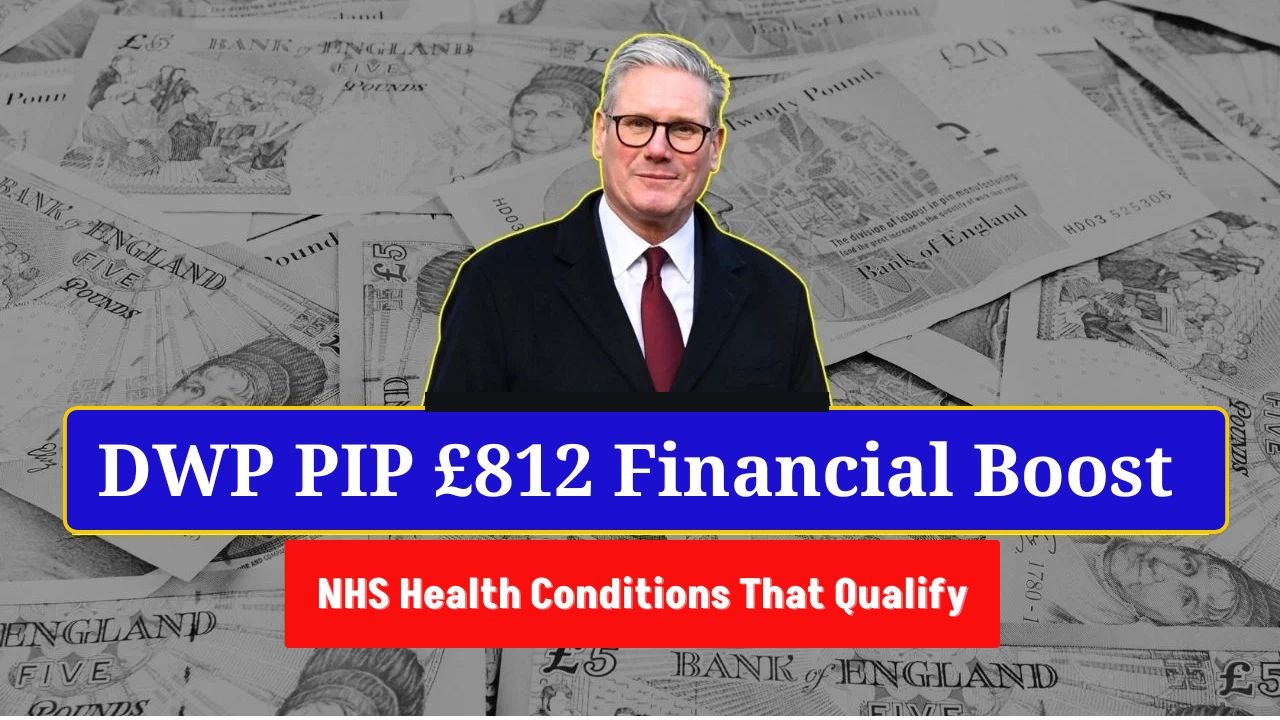DWP PIP £812 Financial Boost: The Department for Work and Pensions (DWP) has announced a £812 financial boost for eligible individuals receiving Personal Independence Payment (PIP). This increase is aimed at providing extra support for those with long-term health conditions and disabilities that affect their daily lives.
If you have an NHS-recognized medical condition, you might qualify for this additional financial aid. Here’s a complete guide to eligibility, qualifying health conditions, and how to apply for PIP to receive the £812 boost.
What Is the £812 PIP Financial Boost?
The £812 boost is an increase in PIP payments for individuals with physical, mental, or long-term health conditions. PIP is a non-means-tested benefit, meaning your income or savings do not affect your eligibility. Instead, it is awarded based on how your condition impacts your ability to carry out daily activities and mobility.
Why Is This Boost Important?
- Provides extra financial support for those struggling with disability-related expenses.
- Helps cover medical costs, mobility aids, therapy, and daily living expenses.
- Available to those who meet the DWP’s criteria for PIP payments.
Who Is Eligible for the £812 PIP Boost?
To qualify for PIP and receive the £812 boost, you must:
- Be aged 16 or over but below State Pension Age.
- Have a long-term physical or mental health condition that affects your ability to carry out daily tasks or move around.
- Have experienced difficulties with mobility or daily living for at least three months, and expect them to last for at least nine more months.
- Undergo a DWP assessment, which determines the severity of your condition.
Which NHS Health Conditions Qualify for PIP?
The DWP recognizes a wide range of conditions under PIP eligibility. Some of the most common qualifying conditions include:
1. Neurological Conditions
- Multiple sclerosis (MS)
- Parkinson’s disease
- Epilepsy
- Cerebral palsy
- Stroke-related disabilities
2. Musculoskeletal Disorders (Bone & Joint Issues)
- Arthritis (Osteoarthritis, Rheumatoid Arthritis)
- Fibromyalgia
- Chronic pain syndrome
- Ankylosing spondylitis
- Osteoporosis
3. Mental Health Disorders
- Depression and severe anxiety
- Post-Traumatic Stress Disorder (PTSD)
- Schizophrenia
- Bipolar disorder
- Obsessive-Compulsive Disorder (OCD)
4. Cardiovascular & Respiratory Conditions
- Chronic Obstructive Pulmonary Disease (COPD)
- Asthma (severe cases)
- Heart failure
- Hypertension-related complications
5. Sensory Impairments
- Blindness or severe visual impairment
- Hearing loss or deafness
- Speech impairments
6. Digestive and Gastrointestinal Conditions
- Crohn’s disease
- Irritable Bowel Syndrome (IBS)
- Coeliac disease
7. Cancer & Immune System Disorders
- Cancer (active treatment or long-term effects)
- Lupus
- HIV/AIDS-related complications
If your condition is not listed, you may still qualify as long as it significantly impacts your daily life and mobility.
How Much PIP Can You Get?
PIP is divided into two components, and the amount you receive depends on how much your condition affects you:
1. Daily Living Component (for help with daily tasks)
- Standard rate: £72.65 per week
- Enhanced rate: £108.55 per week
2. Mobility Component (for difficulty moving around)
- Standard rate: £28.70 per week
- Enhanced rate: £75.75 per week
Those who qualify for both enhanced rates can receive up to £812 per month, totaling nearly £9,700 annually.
How to Apply for PIP and Claim the £812 Boost
If you think you qualify for PIP, follow these steps to apply:
1. Start Your Application
- Call the PIP claim line at 0800 917 2222 (Monday to Friday, 8 AM to 5 PM).
- Request a paper application or apply online via GOV.UK (expected to be available by 2025).
2. Complete the PIP Form (PIP2)
- Provide detailed information about how your condition affects your daily activities and mobility.
- Include supporting medical evidence such as doctor’s reports, prescriptions, and hospital records.
3. Attend a Medical Assessment
- A DWP health professional will evaluate your claim through a face-to-face, phone, or video assessment.
- They will ask about your daily challenges and mobility issues.
4. Receive a Decision Letter
- The DWP will review your case and inform you whether you qualify for PIP payments.
- If approved, payments will be backdated to your application date.
When Will Payments Be Issued?
If you are already receiving PIP, the £812 boost will be added automatically in 2025. If you are a new claimant, you can expect:
- Decision time: Typically 3 to 6 months after applying.
- First payment: Once approved, payments are backdated to your application date.
- Ongoing payments: Paid every four weeks into your bank account.
Other Financial Support Available for PIP Claimants
In addition to PIP payments, you may also qualify for:
- Universal Credit top-up for low-income individuals.
- Housing Benefit to help with rent costs.
- Council Tax Reduction for eligible disabled individuals.
- Free NHS prescriptions and discounted public transport.
If you receive the enhanced mobility rate, you may also exchange your payment for a Motability vehicle under the Motability Scheme.
Final Thoughts
The £812 PIP boost is a welcome financial relief for those struggling with long-term disabilities and health conditions. If you believe you are eligible, make sure to apply as soon as possible and provide strong medical evidence to support your claim. For the latest updates, visit GOV.UK or contact the DWP PIP helpline at 0800 917 2222.













